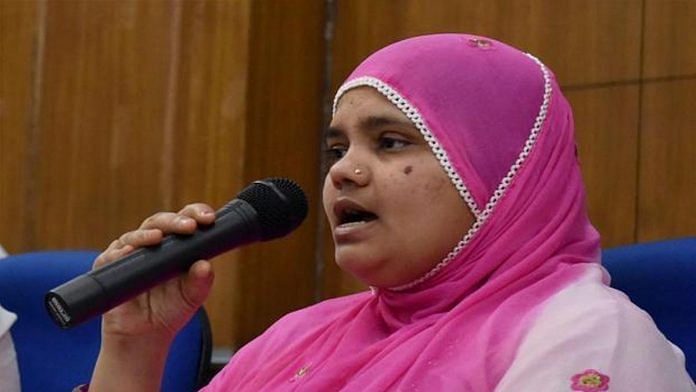Mumbai: In May 2017, after the Bombay High Court upheld life imprisonment for the 11 accused in the 2002 Bilkis Bano gangrape case, Bano, sitting with her husband by her side and little daughter on her lap, addressed a press conference in Delhi, saying she was happy that the judiciary had not failed her.
“The last 15 years were very difficult. We had to keep moving from one place to another; my family also went through a lot,” Bano said at the press conference. “I just want to say that we have got justice. We look forward to beginning our new life.”
In the two years since that day, Bano has got another reason to smile in her 17-year-long ordeal to get justice. The Supreme Court Tuesday ordered the Gujarat government to provide Bano with a compensation of Rs 50 lakh, a government job and accommodation.
Also read: Gujarat High Court acquits ex-minister Maya Kodnani in 2002 riots case
The gangrape victim left to die
Bano’s case was, perhaps, one of the most brutal of the 2002 Gujarat riots. Fourteen members of Bano’s family were killed by a mob at Gujarat’s Randhikpur village when they were fleeing after the Godhra riots in March 2002.
The mob even killed her three-year-old daughter, Saleha, smashing her head with a rock. Bano was then 19, and five months pregnant. She was gang-raped and left to die.
According to the prosecution, as mentioned in the 2017 Bombay High Court judgment, the attackers came in two white vehicles carrying swords, sickles and lathis, and on seeing Bano’s family, started shouting “Musalmano ko maro (Kill the Muslims)”.
Bano was unconscious for several hours after the incident and found herself naked when she regained consciousness. She found a petticoat nearby, covered herself with it, crawled up a hilltop and hid there, the prosecution said.
The next day, she climbed down the hill from the other side and met a tribal woman, who helped Bano with some clothes and later became a prosecution witness in the case. Bano drank some water at a nearby hand pump. She then saw a vehicle with two persons in uniform and requested them to take her someplace safe.
The prosecution said Bano was brought to Limkheda police station where she registered an FIR but it was incorrectly recorded. In the FIR, there was no mention of her being raped. Moreover, though Bano stated the names of the accused, the FIR said she did not know any of the accused.
The 15-year-long battle for justice
At the press conference in Delhi, Bano said she was happy with the judgment and reiterated that she wanted justice, not revenge. To get this justice, however, Bano had to spend 15 traumatic years, constantly moving her residence with her family in fear and staying away from her village.
The Gujarat Police initially dismissed her case in 2003, citing a lack of evidence. The same year, Bano approached the National Human Rights Commission and knocked on the doors of the apex court for justice. The Supreme Court asked the Central Bureau of Investigation (CBI) to probe the matter thereafter. In 2004, the CBI arrested all the accused named by Bano and exhumed bodies of those killed.
Citing threats to her and her family, Bano petitioned the Supreme Court to move the trial from Gujarat. In August 2004, the case was shifted to Mumbai. In 2008, a trial court in Mumbai convicted 13 people of criminal conspiracy, rape and murder, and sentenced 11 of them to life.
The accused challenged their conviction in the Bombay High Court, while the CBI also moved the superior court seeking enhancement of the sentences of three accused to the death penalty, and also challenging the acquittal of seven others.
In May 2017, the Bombay High Court upheld the life imprisonment terms of the 11 accused but quashed the acquittal of seven others, including doctors and policemen, and held them guilty for tampering with evidence.
All these years, Bano did not get any compensation for the brutal incident and the long legal struggle thereafter. The only thing she was offered was a Rs 55,000 penalty levied on each of the convicts that the Bombay High Court directed to be paid to Bano.
Tuesday’s Supreme Court judgement corrected that.
Also read: Modi should have at least offered to resign — Vajpayee, after 2002 riots



